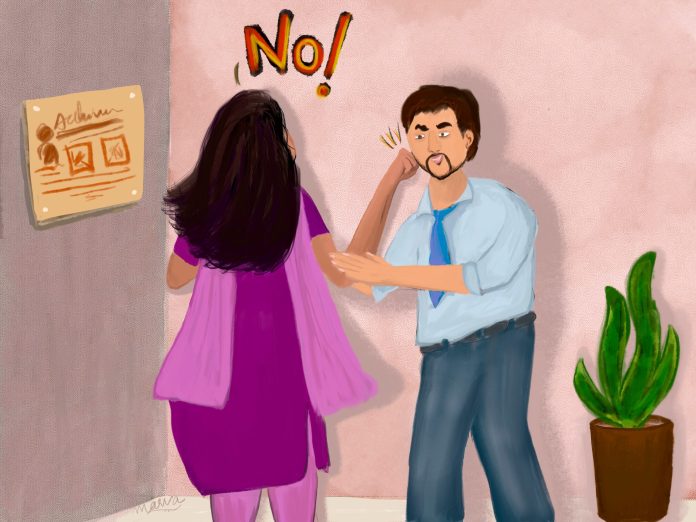Given the all-pervading nature of female subordination, it can be surmised that every aspect of life including the Coronavirus lockdown has had a gendered impact on woman. Ever since the lock down has been announced due to the pandemic, the National Commission for Women has reported a notable upswing in the numbers of cases of domestic violence (nearly 69 in 8 days), that are being brought to their notice. Thus, it deems consideration as to why be the violence against women increasing in the lockdown period?
Men are schooled to feel entitled from the onset and are fed with gender stereotypes. The notion that men are supposed to earn for the family is deeply entrenched in mindsets and clearly manifested in statistics. These notions decrease the participation of women in the workforce and confine them to the domestic spheres. While on the other hand, men start thinking that they are playing a far more pivotal role by earning money and they eventually end up demeaning the household work done by women by dismissing it as being unimportant. This creates a sense of superiority in men and they feel that they have the right to disrespect and abuse women.
Accompanied with this attitude, is the alienation and stress from work and jobs in which men do not have much control over their professional lives. Thus, they try to re-assert their supremacy by abusing the women who are under their authority in the house. The wending out of this frustration that they have carried from their workplaces all this while, is likely to become more frequent in the lock down period because they are in their houses now and are mostly unoccupied. This would thus, probably be the right time for them to self-reflect and regain their crippled confidence in the professional sphere by re-affirming their dominance in the domestic sphere.
Ever since the lock down has been announced, the National Commission for Women has reported a notable upswing in the numbers of cases of domestic violence (nearly 69 in 8 days), that are being brought to their notice.
Apart from the structural problem of capitalism and patriarchy, men are not ready to share the responsibility of domestic chores with their women. On an average, women spend 577% more time on domestic chore as compared to men. On an ordinary day, women spend most of their time performing domestic chores and tending to the needs of children, elderly and their husbands. No wonder, nearly 71% of women are the first ones to wake up and the last ones to go to bed in an average Indian household.
Also read: Islamophobia In The Times Of A Pandemic
This is not only the story of a house-maker, Aparna Jain in her book notes that it is an all pervading problem wherein the women who are well-established in their profession, are also thrusted with the responsibility of cooking chapattis for the family after work. This is how both, housemakers and working women are sole bearers of the domestic responsibilities. The burden of the domestic chores is bound to increase when men are stranded to work from home or to not work at all. Men who feel entitled to the services of their wives would be more demanding. This would result in more arguments and altercations.
The abuse which women are facing is only one side of the story. The glimmer side of the problem is that as per NFHS data, 75% of women do not seek help from anyone. This means that the 69 cases that have been reported are just a minuscule portion of the actual incidents of domestic violence that are occurring. Reporting is already a mammoth of a task for women due to various factors like deeply entrenched gender roles, economic dependence on the husband, fears about the children’s future, lack of support from the maternal family and the frustrating process of police complaints and courtroom complexities.
The abuse which women are facing is only one side of the story. The glimmer side of the problem is that as per NFHS data, 75% of women do not seek help from anyone. This means that the 69 cases that have been reported are just a minuscule portion of the actual incidents of domestic violence that are occurring.
This problem is likely to escalate due to the lockdown due to the pandemic. As the lockdown was announced only 4 hours prior to its implementation, women who feared abuse could not move to safer places. In the case of a friction between the couple, the option which women generally resort to is moving to the maternal house for a brief period. But this option has been completely ruled out due to the restrictions on the movement. Now, the only option is to be locked down with the abuser. It is nearly impossible for a victim to file a complaint when the abuser is at home. At most, a victim can drop in complaints to the NCW in the form of emails and letters, but they are not instant modes of communication and won’t be very helpful in emergencies. It is difficult for women to reach out to the police due to the lockdown and if at all they do, they will be at the risk of being harassed by the parents-in-law after the husband is arrested.
Also read: Surveillance State During A Pandemic: Is Your Data Safe In India?
Moreover, courts are only hearing urgent matters. However, there is no exhaustive list of these “urgent matters” and whether they also include domestic violence complaints is another question. Thus, both the state and the society need to re-think that whether we can allow a policy meant to deal with a pandemic, to give rise to deadlier consequences than the pandemic itself. We need to have more gender sensitive policies and a sensitive implementation of those policies so that intimate partner violence does not become the harshest reality of social distancing.
Featured Image Source: Marva M/ Feminism In India
About the author(s)
Anchal is a second year student at national Law school of India University, Bangalore.





Shab E Barat Ki Raat Ki Fazilat शबे बारात की रात की फ़ज़ीलत हिंदी में Shab e barat ki raat ki fazilat in hindi…